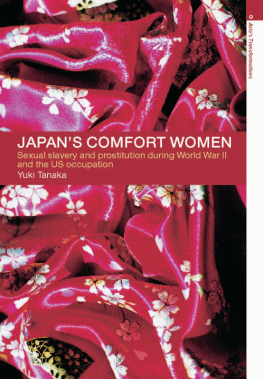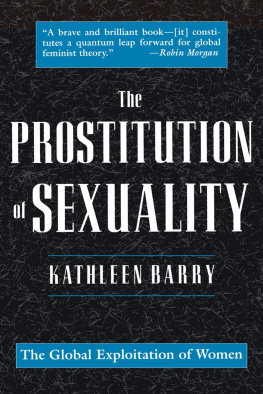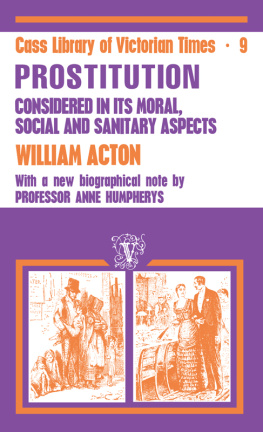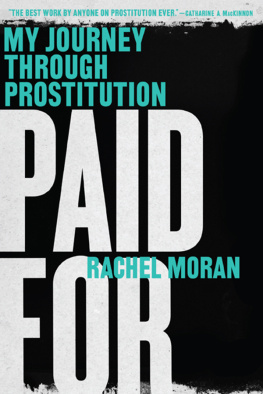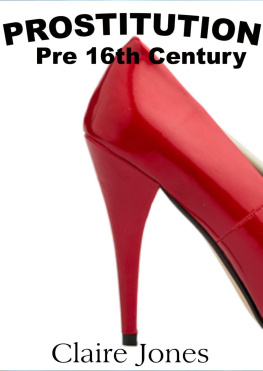PAID FOR
My Journey Through Prostitution
RACHEL MORAN 

W. W. Norton & Company
New YorkLondon
This book is dedicated to my parents, who did the best they could, and to my aunt Margaret, without whom I simply would not have the life I have today.
Sewers are necessary to guarantee the wholesomeness of palaces, according to the fathers of the Church. And it has often been remarked that the necessity exists of sacrificing one part of the female sex in order to save the other and prevent worse troubles... a caste of shameless women allows the honest woman to be treated with the most chivalrous respect. The prostitute is a scapegoat; man vents his turpitude upon her, and he rejects her. Whether she is put legally under police supervision or works illegally in secret, she is in any case treated as a pariah.
SIMONE DE BEAUVOIR, THE SECOND SEX
CONTENTS
What makes the simple act of shaming or blaming people complicated is the knowledge that they each had a specific history, and the more we know about it, the easier it becomes to understand why they did what they did.
RICHARD HOLLOWAY, GODLESS MORALITY
T his book will not read in the style of a traditional memoir; it is not intended to. I have not written about prostitution with the sole focus on my own experience, because this issue is bigger than I am, and it is bigger than my place within it. My seven years in prostitution have brought me to the conviction that prostitution is also a collective, not a purely individual, experience. Therefore, I am writing this book in a manner that alternates between the personal and the universal. We women shared much more than our clients and our secrets. We shared an experience, the threads of which were so common that I have come to realise they form a pattern that makes up the basic shape of the prostitution experience. It presents a horribly ugly image.
I pay no respect or accommodation to the glamorising or sensationalising of prostitution. These are not true depictions of prostitution. They are not even caricatures; they couldnt be, because caricatures are nothing more than amplified truths, and glamour bears no resemblance to the truth here. My assessment of prostitution and my opinions of it I take from the years I spent enduring it and everything I ever saw, heard, felt, witnessed or otherwise experienced at that time. There was no glamour there. Not even the flicker of it. Not for any of us.
There is always a first question asked of the prostituted or formerly prostituted woman. It is always the same one. People want to know: How did you get into it? I believe it is the first question because humans are creatures in need of the comfort of a linear trajectory, and it is difficult to answer because human lives are just not lived along those lines. Another problem with that question is that it can never be fully answered in the space of one conversation, and certainly not in the space of one sentence, as it is asked. It is just too complex to condense without losing something vital of the answer. The truth is, there is no one reason, there is a web of reason, and each part of it, each glimmering thread, is equally important to the overall balance of how you got into prostitution.
The purpose of this book is to take something bad and try to alchemise it into something good. The something good here is in the sharing of this understanding for the benefit of those who want an awareness of it, but who have never and will never experience it for themselves. There is something good in that; I can sense it. There is something good in exposing prostitution for what it really is. It is the illumination that comes from shining a light in dark places. It is the essential honesty in showing the outlines as they truly are.
Men who use prostitutes superimpose upon prostitution an image of it which to them is satisfactory, agreeable and pleasing. This image will vary from man to man. The only things which remain consistent are the fantasy element involved and the reality that shifting male perceptions do nothing to alter the experience of prostitution for the women involved. Their realities remain, concrete and immovable. It is my intention, with this book, to lay those realities before the reader.
I do not expect any of this to be easy, because there is another reason why the answering of the first question is particularly difficult: it is because it involves an unavoidable reaching into the self, a painful emotional excavation. The honest answering requires a feat of penetrative inward searching in areas you dont want to dig, precisely because you know what you will find. But as the most precious artefacts are those which must be hollowed from the ground, the most valuable words are often those which must be laboriously quarried from the self. So I am going to have to be very thorough. I am going to have to dig.
To go back to the start, to begin to answer that first question: my home life as a child was textbook dysfunctional. My parents were both patients of the local psychiatric hospital, St Brendans. It is situated within walking distance of where we lived, in a council housing estate on the north side of Dublin city.
HSE records show that my mother was thought to be schizophrenic and that she was an out-patient of the hospital. My father was sometimes an out-patient, sometimes an in-patient, depending on how his manic depression was affecting him at any given time.
They were also both in the grip of active addiction; my mother to prescription drugs, my father to the lure of compulsive gambling. I dont blame my parents and I know they werent bad people, they were sick people. These facts are simply facts and I harbour no desire to play them for tears. I record them here only because they are central to an understanding of how I became involved in a harmful, depressing, destructive lifestyle that would have been scarcely imaginable to me the day before I first embarked upon it.
I am writing this work as a person who is still in a stage of transition, working towards being secure with my place in society. It is a difficult journey, because it is not as if I am going back anywhere; I am journeying towards somewhere I never was to begin with: our lives as children set us utterly apart from mainstream society and we were raised both painfully aware of it and numbly accepting of it. We understood it. It was our position in the world. My life as a child primed me for prostitution in that it primed me to continue to live outside the sphere of what was normal. It also primed me for any other socially unacceptable or unusual pastime or pursuit; it just happened that several factors of timing and circumstance fell perfectly in place so that prostitution presented itself both as a solitary option and a viable one.
I grew up feeling as though I was separated from the world and all its inhabitants as if by something absolutely solid, but which I could not see, smell, or touch. By the time I was a young teenager in prostitution, this sense of disconnectedness from the world operated so strongly that I could go into a hairdresser to have my hair cut, but I couldnt possibly imagine being the woman holding the scissors. I could go into a bar and order a drink, but I could never imagine standing behind the bar serving it. There was a sense of adequacy, of normalcy, of decency inherent to those socially acceptable positions, and I suppose the sad thing is that, deep down, I felt I had no adequacy, I had no normalcy, and I was not decent.
There was a strangely familiar rhythm, in one particular way, in working as a prostitute: I was not reaching outside of my own belief system. I was not challenging the negative self-image I had been raised with and had carried with me all my life. Of course it caused me much suffering in the longer term, but at that time, in a sense, it was easier to accept that it would not be possible for me to assimilate into society than to set about the very frightening task of accepting my own potential. For me, that didnt even feel like an option, because I hadnt the slightest clue how that could possibly be done or even what the first step towards achieving it might be. Life is, or ought to be, a participatory experience, but it is possible for a person to be so damaged by early lifetime exclusion as to believe their only role in life is that of an observer.
Next page

